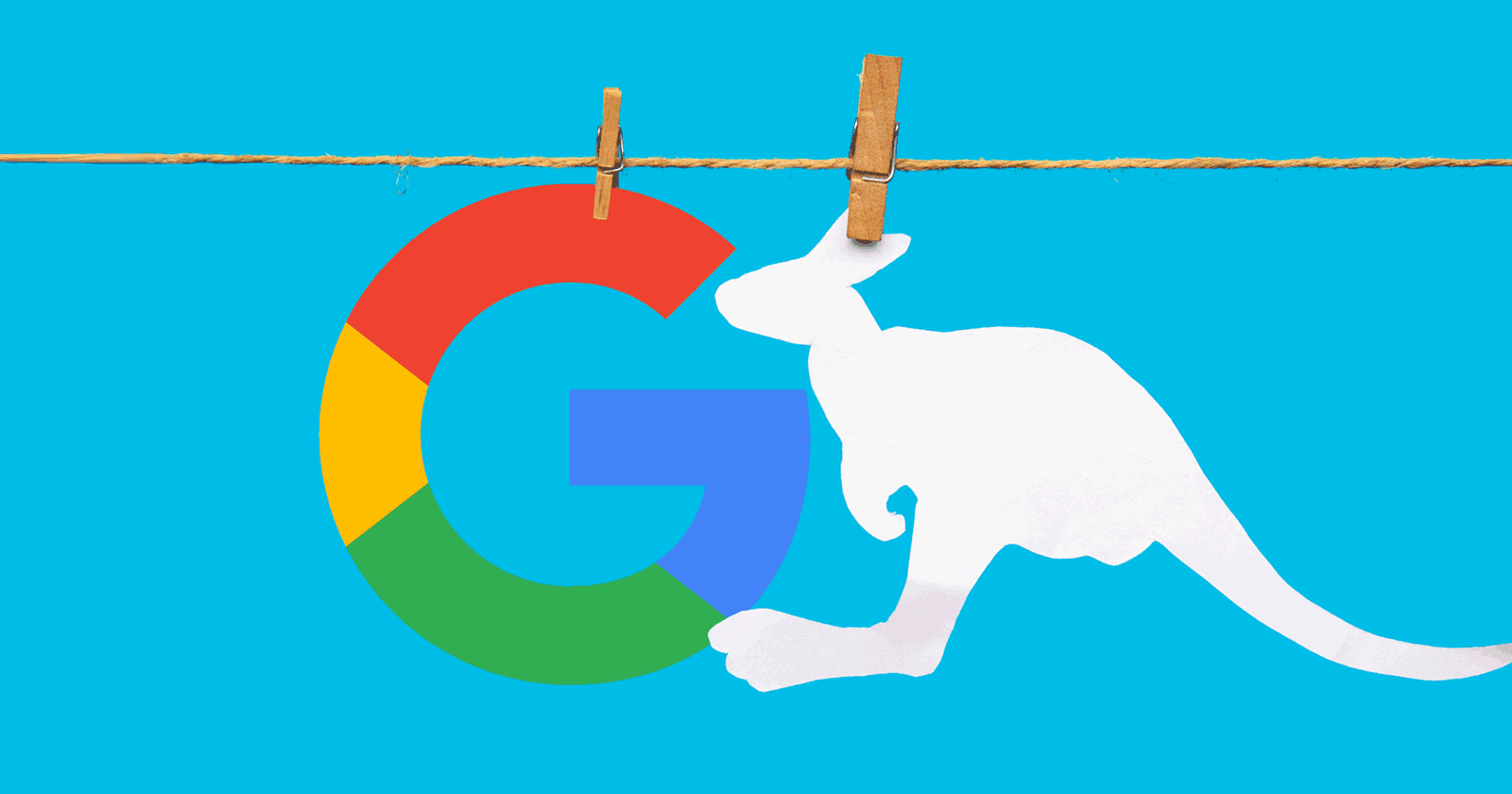Google Agrees to Pay for (Some) Australian News

Google announced that they have negotiated to begin paying for Australian News with publishers who have agreed to participate in the Google News Showcase program. It’s unclear if this is enough to stop Australian legislation that Google claims will force it to leave the country.
News Media Bargaining Code
Australian legislators had been holding hearings and working to enact a new law that would effectively force Google to pay for the privilege of displaying links to Australian News.
Australian news media has suffered a catastrophic decline in advertising revenue, said to be as high as 75% since 2005 and some have laid the blame on Google.
I attended the first Google Zeitgeist conference at Google’s campus in Mountain View California in the early 2000’s and listened to presentations from the leaders of American news media and the common theme was fear that Google would impact their revenues.
The situation of declining revenue has been simmering for a long time.
Google Threatened to Pull Out of Australia
As reported in last week (Will Australia Have to Live Without Google Search?), Google Australia’s Managing Director Mel Silva testified in a Senate hearing that there was no way Google could continue in Australia should the law pass.
She testified:
“If this version of the code were to become law, it would give us no real choice but to stop making Google Search available in Australia.”
Then she threatened that Google Search would pull out of Australia entirely:
“We do not see a way, with the financial and operational risks, that we could continue to offer a service in Australia.”
Google Offers to Pay for News
In a seeming reversal, Google announced that it will pay for Google News through their Google News Showcase program that licenses news for use in their search engine.
According to the official Google announcement:
“To meet growing reader and publisher needs, last year we increased our investment in news partnerships and launched Google News Showcase.
Today we are happy to announce we are rolling out an initial version of the product to benefit users and publishers in Australia, with a keen focus on leading regional and independent publishers given the importance of local information and the role it plays in people’s everyday lives.
News Showcase is designed to bring value to both publishers and readers by providing a licensing program that pays publishers to curate content for story panels across Google services, and gives readers more insights into the stories that matter.”
There is no indication whether this will be enough to stop the new law from going through.
The Guardian reported that one news organization dismissed Google’s News Showcase:
“The parent company of the Sydney Morning Herald and the Age has dismissed Google’s offer to pay media organisations with the launch of News Showcase in Australia, stating it would not negotiate with the tech giant before the news media code comes into effect.”
So it’s unclear whether or not Google’s overture will be enough to keep Australian lawmakers from backing Google into a corner from where Google has threatened to pack up and leave Australia.
Reaction in Australia
I asked Melbourne, Australia digital marketing expert Ash Nallawalla about this and he indicated that in his view the average Australian feels caught in the middle of a struggle between Google and the Australian government and that regardless of what Google says it will do the average Australian will still be able to access Google.
Ash commented:
“The average Australian has shown little to no interest in what is seen as a struggle between two large entities – Google versus some TV companies and News Corporation. At best, many think that Google will no longer be available to them in any of its products.
Google is not threatening to block Aussie IP addresses and I doubt that Google dot com dot au will be shut down.
In a quick check I made, Google dot com was able to give me fairly usable local results to buy a pizza. There will not be a need to find another search engine.”
SEO Professional Nigel Mordaunt in New South Wales, Australia said that local businesses that depend on Google search are worried:
“Business owners are generally concerned as local businesses thrive from Google and are worried about how this could potentially impact their sales. Australian business owners love google and want it to stay.”
Mr. Mordaunt then commented from the viewpoint of the impact to digital marketing:
“As an SEO I think our country is being completely unreasonable. If the news stations really think it’s unfair they can noindex their article/post and not have it appear on the search engines.
Being on google is their choice. I praise google for working with the Australian government.
We were extremely worried about search being pulled as our current government is taking hard stances on many subjects within our country with regards to Google and other technology companies.”
Too Little Too Late?
Google News Showcase may prove to be not enough to placate the news organizations that blame Google for their loss of income.
But many news organizations have already signed up.
According to Google:
“Starting today, a growing number of Australian publishers, leading examples of the best of local and regional journalism, will be paid to provide content for News Showcase.
…As this early version of News Showcase rolls out, the partnerships will provide financial support for some of the country’s most respected independent, local and regional publications including The Canberra Times, The Illawarra Mercury, The Saturday Paper, Crikey, The New Daily, InDaily and The Conversation.
We are looking forward to bringing more Australian media partners on board in the coming weeks and months as we further build out the experience for publishers and users.”
Google is working to come to agreements with more Australian news organizations.
But it’s unclear those efforts are enough to stop Australian lawmakers from passing laws that would force Google to pay through legal channels rather than through negotiated agreements with individual news publishers.
AI
Exploring the Evolution of Language Translation: A Comparative Analysis of AI Chatbots and Google Translate

According to an article on PCMag, while Google Translate makes translating sentences into over 100 languages easy, regular users acknowledge that there’s still room for improvement.
In theory, large language models (LLMs) such as ChatGPT are expected to bring about a new era in language translation. These models consume vast amounts of text-based training data and real-time feedback from users worldwide, enabling them to quickly learn to generate coherent, human-like sentences in a wide range of languages.
However, despite the anticipation that ChatGPT would revolutionize translation, previous experiences have shown that such expectations are often inaccurate, posing challenges for translation accuracy. To put these claims to the test, PCMag conducted a blind test, asking fluent speakers of eight non-English languages to evaluate the translation results from various AI services.
The test compared ChatGPT (both the free and paid versions) to Google Translate, as well as to other competing chatbots such as Microsoft Copilot and Google Gemini. The evaluation involved comparing the translation quality for two test paragraphs across different languages, including Polish, French, Korean, Spanish, Arabic, Tagalog, and Amharic.
In the first test conducted in June 2023, participants consistently favored AI chatbots over Google Translate. ChatGPT, Google Bard (now Gemini), and Microsoft Bing outperformed Google Translate, with ChatGPT receiving the highest praise. ChatGPT demonstrated superior performance in converting colloquialisms, while Google Translate often provided literal translations that lacked cultural nuance.
For instance, ChatGPT accurately translated colloquial expressions like “blow off steam,” whereas Google Translate produced more literal translations that failed to resonate across cultures. Participants appreciated ChatGPT’s ability to maintain consistent levels of formality and its consideration of gender options in translations.
The success of AI chatbots like ChatGPT can be attributed to reinforcement learning with human feedback (RLHF), which allows these models to learn from human preferences and produce culturally appropriate translations, particularly for non-native speakers. However, it’s essential to note that while AI chatbots outperformed Google Translate, they still had limitations and occasional inaccuracies.
In a subsequent test, PCMag evaluated different versions of ChatGPT, including the free and paid versions, as well as language-specific AI agents from OpenAI’s GPTStore. The paid version of ChatGPT, known as ChatGPT Plus, consistently delivered the best translations across various languages. However, Google Translate also showed improvement, performing surprisingly well compared to previous tests.
Overall, while ChatGPT Plus emerged as the preferred choice for translation, Google Translate demonstrated notable improvement, challenging the notion that AI chatbots are always superior to traditional translation tools.
Source: https://www.pcmag.com/articles/google-translate-vs-chatgpt-which-is-the-best-language-translator
Google Implements Stricter Guidelines for Mass Email Senders to Gmail Users

Beginning in April, Gmail senders bombarding users with unwanted mass emails will encounter a surge in message rejections unless they comply with the freshly minted Gmail email sender protocols, Google cautions.
Fresh Guidelines for Dispatching Mass Emails to Gmail Inboxes In an elucidative piece featured on Forbes, it was highlighted that novel regulations are being ushered in to shield Gmail users from the deluge of unsolicited mass emails. Initially, there were reports surfacing about certain marketers receiving error notifications pertaining to messages dispatched to Gmail accounts. Nonetheless, a Google representative clarified that these specific errors, denoted as 550-5.7.56, weren’t novel but rather stemmed from existing authentication prerequisites.
Moreover, Google has verified that commencing from April, they will initiate “the rejection of a portion of non-compliant email traffic, progressively escalating the rejection rate over time.” Google elaborates that, for instance, if 75% of the traffic adheres to the new email sender authentication criteria, then a portion of the remaining non-conforming 25% will face rejection. The exact proportion remains undisclosed. Google does assert that the implementation of the new regulations will be executed in a “step-by-step fashion.”
This cautious and methodical strategy seems to have already kicked off, with transient errors affecting a “fraction of their non-compliant email traffic” coming into play this month. Additionally, Google stipulates that bulk senders will be granted until June 1 to integrate “one-click unsubscribe” in all commercial or promotional correspondence.
Exclusively Personal Gmail Accounts Subject to Rejection These alterations exclusively affect bulk emails dispatched to personal Gmail accounts. Entities sending out mass emails, specifically those transmitting a minimum of 5,000 messages daily to Gmail accounts, will be mandated to authenticate outgoing emails and “refrain from dispatching unsolicited emails.” The 5,000 message threshold is tabulated based on emails transmitted from the same principal domain, irrespective of the employment of subdomains. Once the threshold is met, the domain is categorized as a permanent bulk sender.
These guidelines do not extend to communications directed at Google Workspace accounts, although all senders, including those utilizing Google Workspace, are required to adhere to the updated criteria.
Augmented Security and Enhanced Oversight for Gmail Users A Google spokesperson emphasized that these requisites are being rolled out to “fortify sender-side security and augment user control over inbox contents even further.” For the recipient, this translates to heightened trust in the authenticity of the email sender, thus mitigating the risk of falling prey to phishing attempts, a tactic frequently exploited by malevolent entities capitalizing on authentication vulnerabilities. “If anything,” the spokesperson concludes, “meeting these stipulations should facilitate senders in reaching their intended recipients more efficiently, with reduced risks of spoofing and hijacking by malicious actors.”
Google’s Next-Gen AI Chatbot, Gemini, Faces Delays: What to Expect When It Finally Launches

In an unexpected turn of events, Google has chosen to postpone the much-anticipated debut of its revolutionary generative AI model, Gemini. Initially poised to make waves this week, the unveiling has now been rescheduled for early next year, specifically in January.
Gemini is set to redefine the landscape of conversational AI, representing Google’s most potent endeavor in this domain to date. Positioned as a multimodal AI chatbot, Gemini boasts the capability to process diverse data types. This includes a unique proficiency in comprehending and generating text, images, and various content formats, even going so far as to create an entire website based on a combination of sketches and written descriptions.
Originally, Google had planned an elaborate series of launch events spanning California, New York, and Washington. Regrettably, these events have been canceled due to concerns about Gemini’s responsiveness to non-English prompts. According to anonymous sources cited by The Information, Google’s Chief Executive, Sundar Pichai, personally decided to postpone the launch, acknowledging the importance of global support as a key feature of Gemini’s capabilities.
Gemini is expected to surpass the renowned ChatGPT, powered by OpenAI’s GPT-4 model, and preliminary private tests have shown promising results. Fueled by significantly enhanced computing power, Gemini has outperformed GPT-4, particularly in FLOPS (Floating Point Operations Per Second), owing to its access to a multitude of high-end AI accelerators through the Google Cloud platform.
SemiAnalysis, a research firm affiliated with Substack Inc., expressed in an August blog post that Gemini appears poised to “blow OpenAI’s model out of the water.” The extensive compute power at Google’s disposal has evidently contributed to Gemini’s superior performance.
Google’s Vice President and Manager of Bard and Google Assistant, Sissie Hsiao, offered insights into Gemini’s capabilities, citing examples like generating novel images in response to specific requests, such as illustrating the steps to ice a three-layer cake.
While Google’s current generative AI offering, Bard, has showcased noteworthy accomplishments, it has struggled to achieve the same level of consumer awareness as ChatGPT. Gemini, with its unparalleled capabilities, is expected to be a game-changer, demonstrating impressive multimodal functionalities never seen before.
During the initial announcement at Google’s I/O developer conference in May, the company emphasized Gemini’s multimodal prowess and its developer-friendly nature. An application programming interface (API) is under development, allowing developers to seamlessly integrate Gemini into third-party applications.
As the world awaits the delayed unveiling of Gemini, the stakes are high, with Google aiming to revolutionize the AI landscape and solidify its position as a leader in generative artificial intelligence. The postponed launch only adds to the anticipation surrounding Gemini’s eventual debut in the coming year.
-

 PPC5 days ago
PPC5 days ago19 Best SEO Tools in 2024 (For Every Use Case)
-
SEARCHENGINES7 days ago
Daily Search Forum Recap: April 17, 2024
-
SEARCHENGINES6 days ago
Daily Search Forum Recap: April 18, 2024
-
SEARCHENGINES5 days ago
Daily Search Forum Recap: April 19, 2024
-

 MARKETING6 days ago
MARKETING6 days agoEcommerce evolution: Blurring the lines between B2B and B2C
-

 SEO6 days ago
SEO6 days ago2024 WordPress Vulnerability Report Shows Errors Sites Keep Making
-

 WORDPRESS5 days ago
WORDPRESS5 days agoHow to Make $5000 of Passive Income Every Month in WordPress
-

 WORDPRESS6 days ago
WORDPRESS6 days ago10 Amazing WordPress Design Resouces – WordPress.com News















You must be logged in to post a comment Login